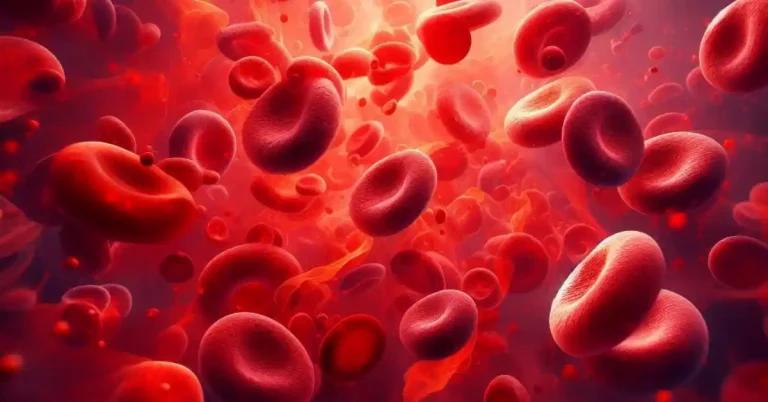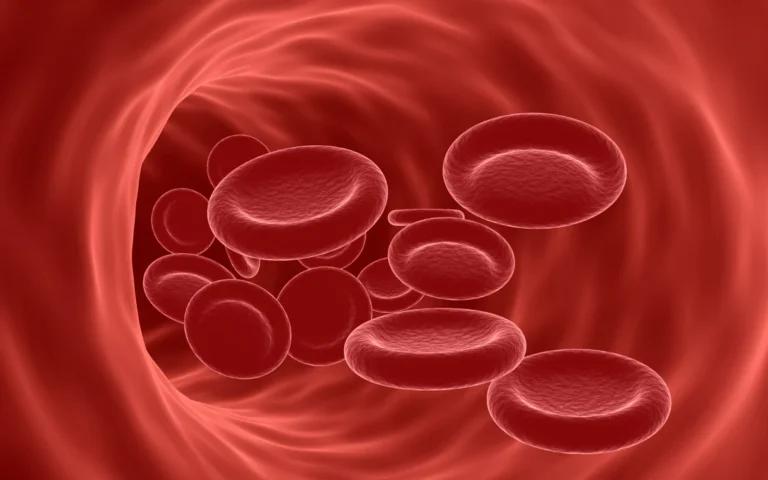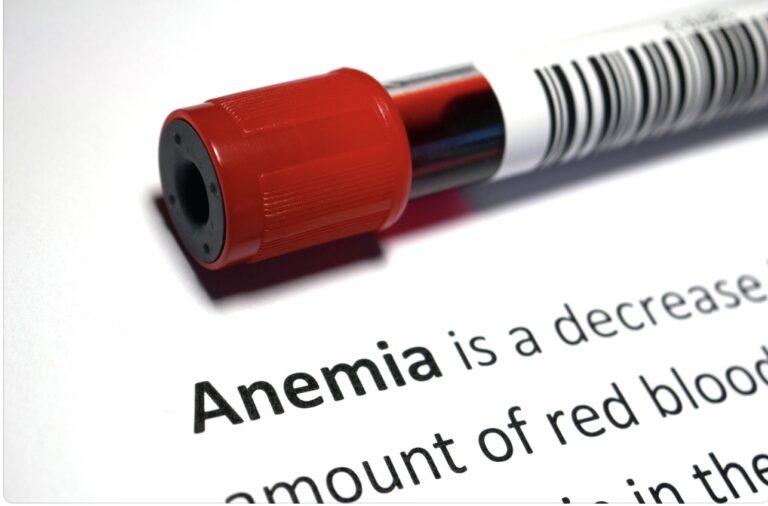Iron deficiency affects roughly 1 billion people globally and the most common cause is the lack of iron in the body. It is thought that 8% of women and 3% of men in the UK population have iron deficiency anaemia. Many people don’t know they have iron-deficiency anaemia and may experience symptoms for years without knowing the cause. Let’s take a look at what causes iron deficiency, the symptoms and the treatments available.
📝 What are the roles of iron in the body?
Iron is a mineral nutrient involved in many important functions in the body including:
- Transporting oxygen around the body: Iron is needed to produce red blood cells which contain a protein called haemoglobin. This protein can carry oxygen from your lungs to all the cells in your body so they can work properly. Haemoglobin is partly made from iron and accounts for about two-thirds of the body’s iron
- Myoglobin – a special protein that helps store oxygen in muscle cells. Myoglobin contains iron and is responsible for the red colour of muscle
- Enzymes – many enzymes throughout the body contain iron, including those involved in energy production. Enzymes are catalysts (increase the rate of chemical reaction) that drive many cell functions
- Immune system– proper functioning of the immune system relies, in part, on sufficient iron. The immune system helps us fight infection
How does iron deficiency anaemia develop?
Eating iron-rich foods is the main source of iron in your body. Excess iron is stored in your body until it’s needed to make haemoglobin. Iron deficiency anaemia develops when your body uses the iron stores faster than they can be replenished, or for some reason, the flow of iron into your system has slowed. There are three stages to this process:
Stage 1
The supply of iron to make new haemoglobin and red blood cells is reduced, but hasn’t yet affected your red blood cells
Stage 2
At this stage iron stores are low and there is a change in the process of producing new red blood cells (erythropoiesis). You develop iron-deficient erythropoiesis and the bone marrow makes red blood cells without enough hemoglobin
Stage 3
At this stage, there isn’t enough iron to make healthy red blood cells from haemoglobin. The concentration of haemoglobin reduces below the normal range causing iron deficiency anaemia and symptoms may appear
⚖️ How much iron do I need?
Age, sex, and whether you consume a mostly plant-based diet all need to be taken into consideration when working out how much iron you need. Average daily recommended amounts are listed below in milligrams (mg) recommended by The Institute of Medicine. Vegetarians who do not eat meat, poultry, or seafood need almost twice as much iron as listed in the table because the body doesn’t absorb non-heme iron in plant foods as well as heme iron in animal foods.
Recommended Dietary Allowances (RDAs) for Iron
AGE MALE FEMALE LACTATION PREGNANCY
- Birth to 6 months 0.27 mg* 0.27 mg*
- 7–12 months 11 mg 11 mg
- 1–3 years 7 mg 7 mg
- 4–8 years 10 mg 10 mg
- 9–13 years 8 mg 8 mg
- 14–18 years 11 mg 15 mg 27 mg 10 mg
- 19–50 years 8 mg 18 mg 27 mg 9 mg
- 51+ years 8 mg 8 mg
🏥 What are the symptoms of iron deficiency?
If you have mild or moderate iron deficiency, you may not realise it as you may just feel tired and run down. Moderate to severe iron deficiency shows up with more obvious signs and symptoms:
- Fatigue and weakness
- Feeling lightheaded
- Shortness of breath
- Restless leg syndrome
- Pica (craving non-food items like ice, chalk, paint or clay)
- Cold hands and feet
- Fast heartbeat
🦠 What are the causes of iron deficiency?
Inadequate iron intake is a common cause of iron deficiency but there are many reasons that a person might become deficient in iron:
Blood loss
Chronic conditions that can cause internal bleeding can lead to iron deficiency anaemia. Stomach ulcers, polyps in the colon or intestines are some examples of these conditions.
Regular use of medicines such as aspirin or non-steroidal anti-inflammatory drugs (NSAIDs), such as ibuprofen and naproxen can lead to gastrointestinal tract bleeding. Heavy periods, regular blood donation and nose bleeds can also be a cause of blood loss.
Low iron intake in the diet
The amount of iron in your diet is important. Insufficient iron levels in the body over a significant period can cause iron deficiency anaemia. Some studies suggest vegetarians or vegans are more at risk of iron deficiency anaemia because of the lack of meat in their diet.
Increased requirement for iron
Breastfeeding and pregnant women need more iron during this time to create enough oxygen for the baby. If this extra iron isn’t iron deficiency can quickly occur.
Health conditions
Some chronic diseases put individuals at increased risk of iron deficiency such as inflammatory bowel disease, celiac disease, Crohn’s disease, autoimmune diseases and kidney disease.
People with kidney disease do not make enough of a substance called erythropoietin. If the body can’t make enough erythropoietin to make red blood cells, iron levels can drop. Celiac disease and Crohn’s disease can make it harder for your intestines to absorb iron from the foods.
Excessive exercise
People who exercise excessively and athletes lose iron through their GI tracts and through the breakdown of red blood cells.
Problem with iron absorption
There are situations when people have problems with iron absorption including:
- A Helicobacter pylori infection of the stomach
- Gastrointestinal surgery, including weight loss surgery, prevents your body from absorbing enough iron. For example, people who’ve had gastric bypass surgery or a gastrectomy may develop iron deficiency anaemia
- Certain rare genetic conditions that disrupt the body’s ability to absorb iron
📈 What happens if iron deficiency anaemia is not treated?
If left untreated, iron deficiency can lead to other health problems. These include:
Fast heartbeat
The heart has to pump more blood to compensate for the low amount of oxygen resulting in an irregular heartbeat, chest pain or shortness of breath. In severe cases, it can lead to heart failure or an enlarged heart.
Pregnancy complications
In severe cases of iron deficiency, a child may be born prematurely or with a low birth weight. Most pregnant women take iron supplements as part of their prenatal care to prevent this from happening.
Delayed growth
Infants and young children who are severely low in iron may show stunted growth and delayed development. They may also be more prone to infections. Low-iron milk such as cow’s milk given before the age of one can also be a cause of low iron levels in this group.
🧪 Diagnosis of iron-deficiency anaemia
After taking a complete medical history and physical examination your healthcare provider will gather more information through blood tests. Here are some of the things that may be done:
- A complete blood count test (CBC test) that checks the red and white blood cells, platelets and other components
- Examination of red blood cells under a microscope. If red blood cells appear pale and smaller than usual this is a sign of anaemia
- Iron levels in the blood will be measured
- Transferrin levels in the blood will be measured. Transferrin is the protein that carries iron
- Ferritin levels in the blood will be measured. Ferritin is a protein that stores iron
- Other diagnostic tests
💉 Treatment for iron deficiency
Treatment is determined by how severe the iron deficiency is but below are some typical treatment options:
Iron supplements
Iron tablets can help restore iron levels in your body. They are recommended to be taken on an empty stomach, which helps the body absorb them better but if they upset your stomach, you can take them with meals. Iron tablets should not be taken with antacids as they can reduce the absorption of iron. It is also recommended to take iron tablets with a vitamin C supplement or a glass of orange juice to improve absorption. You may need to take the supplements for 3-6 months. Iron supplements may cause side effects of constipation or black stools.
Blood transfusions
To treat serious cases quickly blood transfusions may be done to increase the amount of red blood cells and iron in your blood. Red blood cell transfusions will only provide temporary improvement. It is important to find out why you are anaemic, to treat the cause as well as the symptoms.
Change in diet
A simple way to improve iron levels is to increase dietary iron intake. The following foods are a good source of iron to consider:
- Iron-fortified cereals
- Red meat
- Dark green leafy vegetables
- Pulses and beans
- Eggs
- Dried fruit, such as dried apricots, prunes and raisins
Foods rich in Vitamin C are important to include in the diet when iron is low as it helps in iron absorption these include:
- Citrus foods such as oranges
- Strawberries
- Brussel sprouts
- Broccoli
- Blackcurrants
- Peppers
If iron supplements and changes in diet do not improve iron levels, it is likely the anaemia is due to a different underlying cause, most likely due to blood loss or iron absorption problems. This means a different treatment would need to be considered depending on the cause, such as:
- To reduce menstrual blood flow an oral contraceptive may be prescribed
- To treat a peptic ulcer an antibiotic may be prescribed
- To remove a bleeding polyp, fibroid or tumour, surgery may be the preferred option
In severe cases, patients may be prescribed intravenous (IV) iron supplements to replace iron quickly. IV iron comes in different preparations such as iron dextran, iron sucrose and ferric gluconate.
📝 Conclusion
Iron deficiency anaemia is the most common type of anaemia. It occurs when there are too few red blood cells in the body due to a lack of iron. Not eating enough iron-rich foods, blood loss due to menstrual period and an inability to absorb iron are some of the main reasons for iron deficiency anaemia. Treatment for iron deficiency anaemia typically involves iron supplements and treating any underlying conditions. If you suspect you have an iron deficiency, see your healthcare provider for a blood test.
Sources
- Iron – Health Professional Fact Sheet
- Front Matter – Dietary Reference Intakes for Vitamin A, Vitamin K, Arsenic, Boron, Chromium, Copper, Iodine, Iron, Manganese, Molybdenum, Nickel, Silicon, Vanadium, and Zinc – The National Academies Press
- Iron deficiency anemia – Symptoms & causes – Mayo Clinic
- Iron deficiency anaemia – NHS
- Anaemia – iron deficiency |-Health topics A to Z – CKS – NICE
- Iron-Deficiency Anemia: Symptoms, Treatments & Causes
- Anemia of Inflammation or Chronic Disease – NIDDK
Medical Disclaimer
NowPatient has taken all reasonable steps to ensure that all material is factually accurate, complete, and current. However, the knowledge and experience of a qualified healthcare professional should always be sought after instead of using the information on this page. Before taking any drug, you should always speak to your doctor or another qualified healthcare provider.
The information provided here about medications is subject to change and is not meant to include all uses, precautions, warnings, directions, drug interactions, allergic reactions, or negative effects. The absence of warnings or other information for a particular medication does not imply that the medication or medication combination is appropriate for all patients or for all possible purposes.









